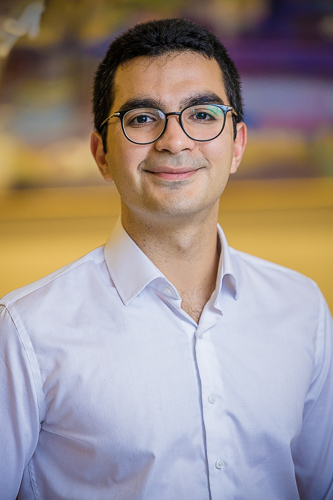D. Carlos Akkar

Welcome!
I am a microeconomic theorist with a focus on information economics. I currently work as a Senior Associate at Charles River Associates (London). This website collects my academic work.
Here is my CV.
Reach me: akkarcarlos (AT) gmail.com
Working Papers
The (Mis)use of Information in Decentralised Markets
(Job Market Paper)
Abstract
A seller offers an asset in a decentralised market. Buyers have private signals about their common value. I study whether the market becomes allocatively more efficient with (i) more buyers, (ii) better-informed buyers. Both increase the information available about buyers' common value, but also the adverse selection each buyer faces. With more buyers, trade surplus eventually increases and converges to the full-information upper bound if and only if the likelihood ratio of buyers' signals are unbounded from above. Otherwise, it eventually decreases and converges to the no-information lower bound. With better information about trades buyers would have accepted, trade surplus increases. With better information about trades they would have rejected, trade surplus decreases---unless adverse selection is irrelevant. For binary signals, a sharper characterisation emerges: stronger good news increase total surplus, but stronger bad news eventually decrease it.
Optimally Dictatorial Committees
Abstract
I study the optimal voting mechanism for a committee that must decide whether to enact or block a policy of unknown benefit. Information can come both from committee members who can acquire it at cost, and a strategic lobbyist who wishes the policy to be enacted. I show that the dictatorship of the most-demanding member is a dominant voting mechanism: any other voting mechanism is (i) less likely to enact a good policy, (ii) more likely to enact a bad policy, and (iii) burdens each member with a greater cost of acquiring information.
Pre-PhD Papers
Collusive College Admissions (reach out for draft)
Abstract
Two colleges compete for students by making costly investments. Students face uncertainty about colleges' quotas. I compare a regime where students can freely apply to both colleges with another where they can only apply to one. The former regime always generates a stable matching of students to colleges. However, colleges might be better off in the latter regime: the low-ranked college benefits from an allocative effect whereby it enrols better students, and the high-ranked college benefits from a competitive effect which decreases the competition for the best students. This incentivises colleges to coordinate their application policies and prevent students from applying to both. This finding helps explain the global persistence of college admission systems that generate unstable matchings.
Daghan Carlos Akkar. Hosted on GitHub Pages ---; Theme by orderedlist -------------------.